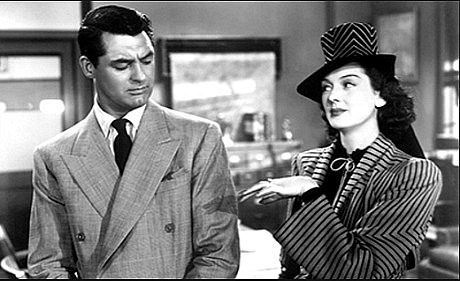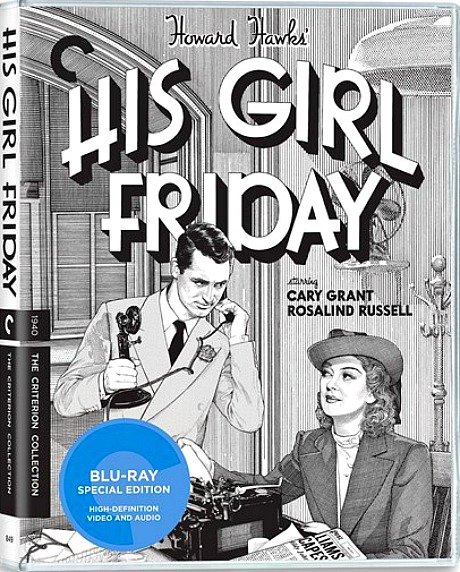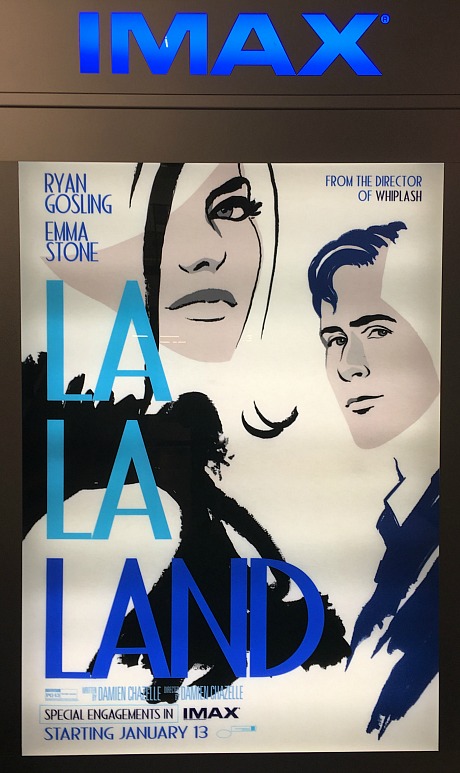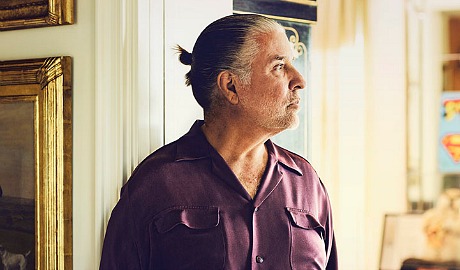There’s a reason filmgoers have always believed that Marlon Brando‘s Terry Malloy was once a serious boxer. When Brando explains to crime commission investigator Leif Erickson that he let his opponent “tag me for a couple of rounds,” he starts performing the moment with that deflection thing, twice jerking his head and neck just so. You knew Brando had done at least some training in the ring, and that was what sold it.
Day: January 13, 2017
Inky, Grain-Smothered Friday Doesn’t Deliver Decent “Bump”
Criterion’s just-released Bluray of Howard Hawks‘ His Girl Friday (’40) is a slight disappointment, I’m afraid. It looks reasonably decent — strong blacks, nice detail here and there, good monaural sound — but I didn’t get a satisfying Bluray “bump” feeling, which is what Hollywood Elsewhere always requires from Blurays of classic films.
An HE “bump” is a significant improvement from the last upgrade in whatever format, and for me the last time the resolution of His Girl Friday really popped my eyeballs was when I watched a “Columbia Classics” DVD from 16 years ago. (Released on 11.21.00, it contained a superb commentary track from Hawks biographer Todd McCarthy.) I had watched Friday on laser disc, VHS, broadcast TV and once or twice in a Manhattan repertory cinema, but this Columbia DVD made it look richer, crisper and cleaner than ever before.


I’m sorry but the Criterion Bluray really doesn’t look that much better than the way the DVD did 16 years ago on my old 480p Sony flatscreen. Yes, it’s a higher-quality transfer (if you project it on a big screen it’ll look much better than the DVD) but it’s completely smothered in digital grain mosquitos. I kept thinking to myself “poor Ralph Bellamy, playing that poor dope from Albany and having to sit there and suffer as those billions of mosquitoes crawl all over his head and neck and hair, not to mention Cary Grant and Rosaland Russell and all the rest besieged by the same swarm.”
For comparison’s sake I rented an Amazon high-def streaming version, and the main difference is that it looks a bit brighter than the Criterion, which has a saturated inky look. The sound and the image sharpness seemed relatively similar.
Still No Petulia Bluray
You can watch a high-def version of Richard Lester‘s Petulia via Amazon streaming, but Warner Bros. still won’t cough up a Bluray. They’ve probably figured that it’s not worth the candle, but man, what a wonderfully fresh, alive-at-a-critical-moment film this is — a window into LBJ-era San Francisco, and right smack dab in the middle of the summer and fall of ’67.
Posted two and 1/3 years ago: Richard Lester‘s Petulia is a chilly, emotionally distant film about a relationship that doesn’t quite come together, and yet there’s something very infectious and fizzy about it. I think it’s the combination of Lester’s dry ironic detachment and the odd atmospheric stirrings of what was happening in San Francisco when he shot it in the late summer and fall of 1967. There are snatches of music and marijuana and Haight-Ashbury in the periphery, but this is a film about being lonely and adrift…about wealth and comfort and social dance steps and two people who want out.
It’s about a 40ish doctor (George C. Scott) who’s bored to death by almost everything in his life and a dishy, spacey rich girl (Julie Christie) who gets it in her head that Scott is some kind of cure for whatever might be ailing her.
Petulia, which I return to every four or five years when I don’t feel like watching anything else, is composed of thousands of slices and fragments of everything and anything that was “happening” back then…sounds, whispers, glances. It’s somewhere between a tapestry and a jumble of pieces that don’t seem to fit, and yet they do when you step back. I think it’s one of the sharpest cultural time-capsule films Hollywood has ever churned out, and at the same time a curiously affecting love story.
The Humiliations
Reaction #1: If I was a movie star and Lynn Hirschberg asked me to sing “I Will Survive” on-camera, I’d tell her to forget it. I don’t sing girly disco-beat songs that I can’t stand, for one thing. Even in the shower I don’t reach for the high notes or, you know, belt stuff out. I only sing within my range, so if you really want me to perform I’ll sing “Be-Bop Baby“, “Your Smiling Face” or “Nice ‘n’ Easy.” Reaction #2: Why do these guys seem averse to actually hitting notes? Reaction #3: I love it when someone cracks a joke on the Charlie Rose Show and genuine laughter ensues, but I really hate these goof-off, make-a-fool-of-yourself, farewell-my-dignity prank interviews that everyone submits to these days. I blame MTV.com’s Josh Horowitz for starting this loathsome trend. If Horowitz were to interview me for whatever reason I’d fight him at every turn. My attitude would be “no offense but fuck you, Josh, and your stupid-shit goofball questions.” I guess Jimmy “Trump hair muss” Fallon is the main perpetrator in this realm now.
The contestants: Emma Stone, Natalie Portman, Greta Gerwig, Anya Taylor Joy, Amy Adams, Chris Pine, Hailee Steinfeld, Felicity Jones, Taraji P. Henson. (I omitted Matthew McConaughey because I really hate his performance in Gold, and so he’s in the HE doghouse.)
Who Sleeps For 10 Hours Nightly?
According to Tatiana Siegel‘s 1.12 Hollywood Reporter interview with Jon Peters, the absentee producer and former mogul goes to bed each night at 7:30 pm and wakes up at 5:30 am. The guy is 71 and he crashes each night before the European dinner hour and stays under for 10 hours? That’s the pattern of a typical 92 year-old. If Kirk Douglas (100) or Norman Lloyd (101) want to bag ten hours per night, fine. But someone Peters’ age?
You don’t want to sleep too much. Eight hours will more than suffice. Who wants to miss those sublime late-hour activities (book-reading, movie-watching, Real Time with Bill Maher, evening walks, hanging with your cat)? Plus you don’t want to sacrifice too much in the way of wide-awake consciousness because one day you’ll be going to sleep permanently, and that, trust me, will be very, very restful. What is Peters doing, rehearsing for that moment?
Also: There’s nothing that looks stupider than a long-haired guy walking around with his hair pulled into a tight bun and a little pony tail. If you want to wear your hair like Fabio, fine. If you want to wear it a bit shorter, cool. It’s even okay if you want to do a tennisball-head thing…actually, that’s not okay on second thought but we’ll let that go for now. But pony tails look ridiculous. (Are you listening, Casey Affleck?)
Infamy Lasts Longer
This is yesterday’s news but in the below clip Nicole Kidman cancelled her coolness cred in one swift stroke, and I mean possibly for the rest of her life. By saying “we need to support Donald Trump” because “he’s now elected [and] that’s what the country’s based on,” she murdered any notions that might have been floating around about her being a member of the committed-and-connected Meryl Streep Club of Resistance to the Monster.
Kidman sounded to me like a profoundly unthoughtful middle-aged wife of a Wall Street broker from suburban Greenwich or Fairfield, a woman who shops a lot and owns a cute dog and belongs to a bridge club.
Full death quote: “I just say…he’s now elected and we as a country need to support whosever the president, because that’s what the country’s based on. Whatever, however that happened…he’s there and let’s go. I’m always reticent to start commenting politically. I’ve never done it in terms of America or Australia. I’m issue-based. I also do an enormous amount of fundraising for breast and ovarian cancer, because that’s something that’s affected my family deeply.”
That’s it — she’s dead to me. Okay, if she sees the light one day and becomes “woke,” I might consider cutting her a break.
Excuse Me But No — You’re Missing The Thing
An HE thread guy complained yesterday about La La Land, lamenting that “it had so much potential, and it ends up being about absolutely nothing. There’s no subtext to it…it’s like a film school exercise. I’m glad that people like it, but I don’t understand why.”
To which I replied: “No subtext? La La Land isn’t just some film-school exercise or tribute to old-time musicals or Jacques Demy. It’s a happy-sad thing that throbs with real-life subtext. It’s a kin of Carousel in that it says over and over that life is mostly no picnic and sometimes fraught with struggle and disappointment. It understands love in both a present-day and eternal context, but is occasionally a cousin of Dancer in the Dark in its view that sometimes musical dreams are necessary alternate realms — places that we go to for both nourishment and escape.
“La La Land is about the well-known fact that love affairs aren’t easy, and that sometimes they can dwindle or lose steam in the face of hard career choices and financial burdens. It’s also invested in the basic scheme of a musical, which is that people of any spirit or dimension will sometimes fly or dive into alternate musical realities in their heads, especially when they’re really caught up in strong emotions or a place of deep need or anguish…when they want to dwell in their dreams about the here-and-now or more often what might be, or what might have been.
“The ending of La La Land is shattering because it creates transcendent musical and visual poetry out of a certain ‘what might have been’ dream. It floods you, melts you right down.”
“I Saw It Again Last Night…”
The IMAX version of La La Land rolls out today in roughly 100 IMAX venues nationwide and in precisely seven IMAX theatres in the Los Angeles area. I saw Damian Chazelle‘s masterpiece again last night, my fourth time, at IMAX headquarters in Playa Vista. It really does work a little more exquisitely each time. Every line, musical cue, edit, shot and insert shot (including one of Hoagy Carmichael‘s piano stool in Seb’s jazz club), every emotion…it all fits together like a fine Swiss watch.
But all the IMAX presentation boils down to, really, is seeing it on a bigger screen. Which is a welcome thing — don’t get me wrong. It’s just that La La‘s widescreen aspect ratio (2.55:1) precludes the super-tall-screen aspect from being a factor. It would be mind-blowing if Chazelle had decided during filming to capture each La La Land shot within a full IMAX-y 1.43:1 aspect ratio — then you’d really have something special. Then you’d be seeing a boxier, more headroomy version — literally an alternate cut. But that wasn’t the plan.

The designers of this new La La Land poster realize, of course, that Ryan Gosling never appears clean-shaven in the film — he is a total three-week beardo in each and every scene.
The 2.55:1 aspect ratio harkens back to the early CinemaScope days (’53 to ’54) before the addition of optical tracks cut the a.r. down to 2.35 or thereabouts.
2.55:1 was also the aspect ratio of CinemaScope 55, a 20th Century Fox format that was used for a grand total of two (2) features, both released in 1956 — Carousel and The King and I. But Fox didn’t make 55mm release prints for either film; both were released in conventional 35mm CinemaScope.

